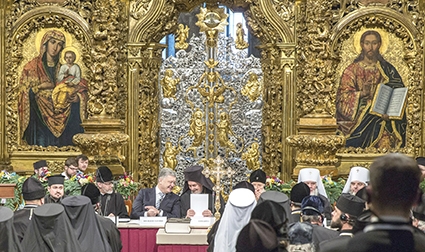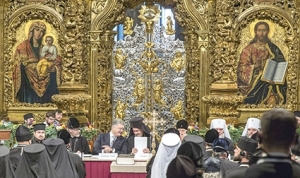God Engaged: Orthodox Christianity in the “Big Game”
Op-ed
On January 5, Ecumenical Patriarch Bartholomew, the head of the global Orthodox Church and the first among equals, signed a decree “Tomos” in Istanbul granting the Ukrainian Church autonomy from the Russian Orthodox Church (alternatively, the Moscow Patriarchate, abb. ROC) and recognizing its autocephaly (independence). The event was attended by the head of the Ukrainian government, President Petro Poroshenko and other high officials. Earlier, Bartholomew called on leaders of other autocephalous churches, most importantly in Serbia, Bulgaria, Romania and Georgia, to support his initiative. The decision to remove the Ukrainian Church from the subordination of the ROC which had existed as such for centuries was highly criticized by Patriarch Kirill of Moscow, the head of the Moscow Patriarchate, as a rude violation of religious laws and an obvious political step leading to religious strife and a division in the global Orthodox community.
And while supporters of Bartholomew’s historic move both in Ukraine and abroad, especially in Georgia, react according to how they perceive the victory over the corrupt Russian Orthodox Church controlled by Putin’s regime, it is obvious that there is much more than just the right of Ukrainian people for religious independence at stake here. The Orthodox Christian god has been officially engaged by all sides in the so-called “big game” now: political and ideological rivalry where religion is used for concrete goals. The absolute majority of the so-called pro-Western and pro-Ukrainian analysts and experts fiercely defend Bartholomew’s step as fair and logical, bringing forth arguments about historical justice and more. At the same time, there are those who are not so positive about it. This pessimism comes from a few extremely puzzling moments that are mainly, frequently intentionally, overlooked and neglected.
Orthodox Christianity and Politics
Unlike other Christian denominations, Orthodox Christianity was and still is extremely involved in domestic and foreign politics. Political actors actively attract religious institutions into various state, political and ideological activities to gain electoral support, legitimacy and to justify their activities, while local churches are keen to use this “dependency” to influence political decision-making and, sometimes, even pursue a harsh policy of proselytism. This mutual interdependence and interconnection make it impossible to build a stable secular state without interference from religious institutions and persons in state affairs.
And so, here is perhaps the biggest question that puzzles experts and analysts: was Bartholomew’s initiative purely a religious one? It is pretty questionable that Ecumenical Patriarch would have dared and/or decided to push the topic of an autocephalous Ukrainian Church in the midst of the fight between Kiev and Moscow and, in general, the West and the East, without any serious political back-up; especially if we take into consideration that Bartholomew, in theory, holds sway over more than 300 million Orthodox Christians around the world, from which the majority are Russian and when the biggest Orthodox Christian Church is the Moscow Patriarchate.
The second important question regards the strong bond between political elites and local religious institutions that have a place in almost all Orthodox Christian countries. We can easily outline at least three exceptional cases: Russian Federation, Ukraine and Georgia.
The Moscow Patriarchate seems to be a continuation of the Russian state (ad notam, historically given condition) and is being actively used by the Kremlin to pursue its domestic and foreign policies through support and justification from the religious institution and its representatives. At the same time, the State acknowledges the Moscow Patriarchate’s support and backs its frequently questionable domestic (the law on protecting religious feelings) and foreign (dominance over global Orthodox Christian community) initiatives. The same could be seen in Ukraine. Until it received “Tomos,” there were three Orthodox Church branches: the Ukrainian Orthodox Church or Kiev Patriarchate (independent), the Ukrainian Autocephalous Orthodox Church (independent) and the Ukrainian Orthodox Church (abb. UOC, subordinated to the Moscow Patriarchate). After accepting autocephaly, the first two independent churches formed the Orthodox Church of Ukraine (abb. OCU) that, by initial design and primary mission, was to counter and oppose the UOC that was and still is the leading Orthodox institution in the country. So far, the OCU, a priori, is being considered by all sides and, most importantly, by Poroshenko’s government, as a political tool against the Kremlin; and we may argue that the Ukrainian state will do its best to put the newly formed local autocephalous church at the service of political elites. It is also highly questionable whether the OCU can really counter the UOC without political, ideological, administrative and financial support from the government and affiliated individuals.
Where the Moscow Patriarchate and the Orthodox Church of Ukraine are being used by political elites, the Georgian Orthodox Church (abb. GOC) is intelligently manipulating the Georgian elites; where in the Russian Federation and Ukraine we are witnessing the existence of so-called “pocket churches” that lie as a huge burden both on governments and societies, Georgian society is easily “pocketed” by the Georgian Orthodox Church. As still the most trusted and influential institution in the country, the GOC interferes in almost every single aspect of everyday life in Georgia. This frequently harmful practice restrains the country from transforming into the Western-type secular state it claims it wants to be.
Orthodox Christianity at a Crossroads
The establishment of the Ukrainian autocephalous Orthodox Church not only officially involved Orthodox Christian god in global politics, but also led to historic strife; and if decision of the Moscow Patriarchate to cut ties with the Ecumenical Patriarchate of Constantinople was somehow a logical retaliation, other autocephalous churches suddenly appeared to be at a crossroads, with only two options – follow Bartholomew or support the ROC. We may argue that no one would want to be involved into this dispute; furthermore, for some autocephalous churches, such as those of Serbia and Georgia, this decision is highly sensitive and is directly attached to important political issues.
It is no secret that Serbia holds strong political, cultural and religious ties with the Russian Federation. Furthermore, Serbian officials openly re-iterate the importance of these ties and are still extremely thankful to the Kremlin for the support given during the breakup of Yugoslavia. Additionally, Moscow was in the vanguard of those states that did not support the separation of Kosovo from Serbia, and Russia is still the main and most important ally of Belgrade in its attempts to bring the partially recognized state under its jurisdiction. It seems the Serbian Orthodox Church will definitely think twice before backing Bartholomew’s decision and by default directly oppose the Moscow Patriarchate.
This situation is even more challenging for the Georgian Orthodox Church. Despite fierce support for the Orthodox Church of Ukraine from local pro-Western forces and parts of Georgian society, which perceive these events as the restoration of historical justice, it is obvious the situation is much more complicated. Georgia has two separatist regions (Abkhazia and the so-called South Ossetia) which were recognized as independent states by the Russian Federation, Venezuela, Nicaragua, Nauru and Syria. Despite supporting Abkhazian “sovereignty,” the Russian Orthodox Church does not officially recognize the Abkhazian Orthodox Church (abb. AOC) and it is, de jure, still subordinated to the Georgian Orthodox Church. Representatives of the GOC are afraid that by recognizing the establishment of the Ukrainian autocephalous Church, they may directly push the Moscow Patriarchate to recognize the AOC. Some may argue that the ROC has de facto already done so and representatives of the Russian Orthodox Church are working secretly on the ground, and yet there is a huge difference between official recognition and masked activities. Finally, Georgia has been surrounded by non-Christian nations for centuries with the Moscow Patriarchate its only neighboring religious ally; thus, this historical memory is also present.
Useless Independence?
Without doubt, the Ukrainian people deserve the right to have religious institutions that reflect their attitudes and aspirations. Nevertheless, it is questionable whether the reception of autocephaly was and is something that Ukraine really needed. Will it solve the country’s challenges and lead to the unification of society? Unlikely.
As said above, the Poroshenko’s government sees autocephaly as a pre-election campaign project that should, in theory, raise support among the local electorate and help its leader to keep his presidential post. This is despite the unpleasant fact that Poroshenko failed to lead the state into a better future. Particularly, we may argue that Ukraine was always and still is in dramatic need of independence from its own oligarchs and other questionable figures rather than autocephaly from the Moscow Patriarchate. The reasoning that the inability of every single pro-Western revolutionary movement and leader to handle the corruption and other anti-state practices lies in the dependence of the Ukrainian Church from the Moscow Patriarchate is highly dubious. The reception of autocephaly will not lead to a dismantling of the corrupt political system that exists in Ukraine, as that is just how Poroshenko wants it to be.
Secondly, frequently both international and domestic observers overlook the issue of social divisions in Ukraine. Approximately half of the eastern population are ethnic Russians, and these will most likely not transfer from the Moscow Patriarchate to the Ukrainian Orthodox Church, especially taking when taking into consideration the political context. Furthermore, even among Ukrainians there are plenty who are devoted to the Ukrainian Orthodox Church subordinated to the ROC. Thus, the establishment of an autocephalous church may further deepen the social divisions that have developed due to various questionable decisions made over time by the political elite, such as the controversial language bill restricting and downgrading use of the Russian language in Ukraine.
In conclusion, the establishment of the Ukrainian autocephalous Church can be perceived as an official engagement of the Orthodox Christian god in global politics, where all involved actors try to use religious institutions and affiliated individuals for their own political and ideological interests while local churches try to grab their own benefits. Other autocephalous churches, especially in Serbia and Georgia, now find themselves at a crossroads that may lead to some extremely interesting political developments in the future. If the Georgian Orthodox Church backs Bartholomew’s initiative, we may witness the appearance of another partially recognized Church, the Abkhazian, which will result in the further deterioration of Georgian-Russian relations. At the same time, the Ukrainian autocephalous Church may be not the answer that the majority of Ukrainians hoped for, as it is uncertain how it will help the country to finally escape its corrupt circle or build the modern prosperous and secular state that they seek.
Archil Sikharulidze is a co-founder and an executive director of the Center for Systemic Political Research (CSPR) a Tbilisi-based research institute (Republic of Georgia) and an editor of Georgian Journal of Systemic Politics. Sikharulidze extensively writes about political processes in Russia and in the post-Soviet space in general.
By Archil Sikharulidze
Image source: Mikhail Palinchak, Ukrainian Presidential Press Service/Pool Photo via AP












